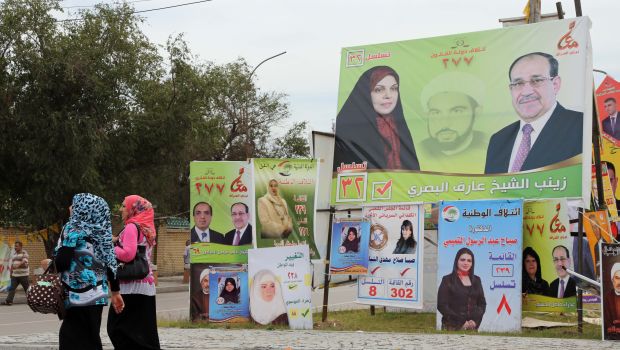
People walk past election campaign posters on Saadoun Street in central Baghdad, Iraq, on Tuesday, April 15, 2014. (AP Photo/Karim Kadim)
Alawi, an independent MP who is running in the April 30 poll as a member of the Sadrist Movement, said that a clash between the movement and the prime minister’s State of Law Coalition over the shape of the next government of Iraq was all but inevitable.
Alawi told Asharq Al-Awsat: “The Sadrists have [taken] a strong stance against a third term for Maliki regardless of the number of seats they win or Maliki wins, and regardless of the pressure exerted by foreign parties, especially the Iranians.”
“At a time when the Sadrists want to expedite the formation of alliances to establish a strong ground to eliminate Maliki, all indications point to the possibility of the eruption of a crisis after the elections between the Sadrists and Maliki,” he added.
Current opinion polls put Maliki’s State of Law Coalition in the lead, but it is not expected to win an outright majority, making an alliance-building exercise on the part of political rivals seeking to form a new government likely in the wake of the poll very likely.
Followers of the populist cleric Moqtada Al-Sadr, who has labelled Maliki a “tyrant” and a “dictator,” are determined to prevent the prime minister from winning a third consecutive term.
Alawi said the process of forming a new government would be a dangerous period for Iraq, and accused Maliki of being willing to resort to violence to stay in power. “[Maliki] has an army and a police force, and whatever he desires in emergency laws,” he said, adding, “[Maliki] may resort to means which his adversaries or partners . . . may be unhappy with, and therefore, the future is not promising and can be said to be moving to a dark period.”
Despite Alawi’s warnings, other members of the Sadrist movement were bullish about the prospect of keeping Maliki out of power after the forthcoming election.
Baha Al-Aaraji, leading figure in the Sadrist movement, said on Sunday: “The Sadrist movement will fight the elections with three lists; the first is the National Partnership Rally, the second the Al-Ahrar Alliance, and the third the Elite Movement . . . We will work on forming a government as soon as possible in order to end the crises and save the country from division.”
Elsewhere, recent statements from the leader of the Wataniya bloc, Iyad Allawi, about reaching accords to form Iraq’s next government with the Sadrists, the Kurdistan Alliance and the Islamic Supreme Council of Iraq (ISCI), have been met with mixed reactions within Iraq’s political blocs.
Meanwhile, Sadrist Amir Al-Kinani told Asharq Al-Awsat: “The meetings and gatherings may be premature at this stage but, at the same time, we have a clear vision on how the next government should be.”
“As much as we reject a third term for Maliki for reasons we talked about many times, and which had been pointed out by Moqtada Al-Sadr, which is to end dictatorship, the candidate we prefer for the premiership is an independent technocrat, who does not belong to any party,” he said.
Deputy Head of the Muwatin Bloc, Abdel-Hussein Abtan, told Asharq Al-Awsat: “It is too early to discuss such issues, because we do not want alliances and have no stance on one [candidate] or another; The elections have not happened yet, and therefore, our focus is on the elections.”
Abtan added: “The Muwatin bloc has announced its election program and it represents our vision on how to build a state. What concerns us is the program, not the posts, and what we want is for the next government to be a government of programs, not a government of posts.”
